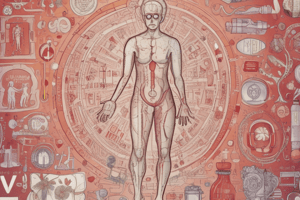Podcast
Questions and Answers
What does the prefix 'anti-' mean?
What does the prefix 'anti-' mean?
- Around
- After
- Against (correct)
- Before
What does 'phag/o' refer to?
What does 'phag/o' refer to?
- Eat (correct)
- Virus
- Cell
- Spleen
What does the term 'lymphaden/o' indicate?
What does the term 'lymphaden/o' indicate?
- Lymph vessel
- Antigen
- Lymph fluid
- Lymph node (correct)
What does 'tox/o' signify?
What does 'tox/o' signify?
What does 'sarc/o' mean?
What does 'sarc/o' mean?
What does '-plasm' refer to?
What does '-plasm' refer to?
What does 'immun/o' indicate?
What does 'immun/o' indicate?
What do 'splen/o' denote?
What do 'splen/o' denote?
What does 'onc/o' mean?
What does 'onc/o' mean?
What do 'spirochetes' refer to?
What do 'spirochetes' refer to?
What is referred to by 'streptococci'?
What is referred to by 'streptococci'?
What does 'malignant' mean?
What does 'malignant' mean?
It is true that 'herpes zoster' refers to a type of infection caused by the varicella-zoster virus.
It is true that 'herpes zoster' refers to a type of infection caused by the varicella-zoster virus.
'Anaphylaxis' is a mild allergic reaction.
'Anaphylaxis' is a mild allergic reaction.
What is the term for 'the removal of the spleen'?
What is the term for 'the removal of the spleen'?
What does 'adjuvant' refer to?
What does 'adjuvant' refer to?
What is the meaning of 'lymphangitis'?
What is the meaning of 'lymphangitis'?
What does 'cytotoxic' mean?
What does 'cytotoxic' mean?
Flashcards are hidden until you start studying
Study Notes
Word Parts and Definitions
- anti-: A prefix meaning against or opposite.
- phag/o: Relates to eating or consuming, often used in the context of immune cells that engulf pathogens.
- lymphaden/o: Refers to lymph nodes, which are vital components of the immune system.
- lymphangi/o: Pertains to lymphatic vessels.
- tox/o: Indicates toxicity or poison, commonly used in medical terminology related to toxins.
- sarc/o: Relates to flesh or connective tissue.
- -plasm: A suffix meaning something formed or molded, frequently applied in biological contexts.
- immun/o: Refers to the immune system.
- splen/o: Pertains to the spleen, an organ involved in immune response and blood filtration.
- onc/o: Refers to tumors, indicating a relationship with cancer.
Pathogens and Diseases
- spirochetes: A group of bacteria known for their spiral shape and motility.
- streptococci: Round-shaped bacteria organized in chains, associated with various infections.
- staphylococci: Bacteria that form clusters, commonly linked with skin infections.
- viruses: Microscopic infectious agents that can replicate only inside living host cells.
- parasites: Organisms living on or in a host, often causing disease.
Body Structures and Functions
- spleen: Essential for blood filtration and immune response.
- benign: Term describing non-cancerous conditions.
- herpes zoster: Also known as shingles, caused by reactivation of the chickenpox virus.
- interferons: Proteins that act as signaling molecules in the immune response.
- thymus: An organ crucial for T-cell development.
- tonsils: Lymphatic tissues that help protect against pathogens entering through the mouth and nose.
Lymphatic System Conditions
- lymphedema: Swelling due to the accumulation of lymph fluid.
- lacteals: Specialized lymphatic vessels in the intestines that absorb dietary fats.
- toxoplasmosis: Infection caused by Toxoplasma gondii, often asymptomatic in healthy individuals.
- macrophage: Immune cells that engulf and digest pathogens and debris.
Immune Response Components
- lymph nodes: Critical in filtering lymph fluid and housing immune cells.
- vermiform appendix: A small organ that may play a role in gut immunity.
- complement system cells: Part of the immune system that enhances the ability to clear pathogens.
- intact skin: Acts as a primary barrier to pathogens.
Cellular Immunity and Treatments
- cytokines: Signaling molecules that modulate immunity and inflammation.
- cytotoxic: Refers to cells or agents that destroy other cells, often used in cancer therapies.
- plasma cells: Immune cells that produce antibodies.
- synthetic interferon: Man-made protein used in some treatments for viral infections and cancers.
Medical Terminology and Treatments
- sarcoma: A type of cancer originating from connective tissues.
- adenoids: Lymphatic tissue involved in the immune response, located in the throat.
- lymphoscintigraphy: Imaging technique used to assess the lymphatic system function.
- malignant: Describes cancerous growths that spread to other parts of the body.
- varicella: Known as chickenpox, a highly contagious viral infection.
Vaccinations and Immunity
- carcinoma in situ: Early-stage cancer that has not invaded surrounding tissues.
- ductal carcinoma in situ: A specific type of breast cancer that is non-invasive.
- measles, mumps, and rubella vaccination: A combined vaccination for three viral diseases.
- antigen: Any substance that triggers an immune response.
Advanced Medical Concepts
- angiogenesis: Formation of new blood vessels, often associated with tumor growth.
- Kaposi's sarcoma: A type of cancer that causes lesions in the skin, often linked to HIV infection.
- anaphylaxis: A severe, potentially life-threatening allergic reaction.
- brachytherapy: A form of internal radiation therapy.
Final Concepts
- western blot: A method for detecting specific proteins in a sample, often used in medical diagnostics.
- lymphangioma: A benign tumor of the lymphatic vessels.
- adjuvant: A substance that enhances the body's immune response to an antigen.
- immunology: The branch of medicine that deals with the immune system and its disorders.
Studying That Suits You
Use AI to generate personalized quizzes and flashcards to suit your learning preferences.




